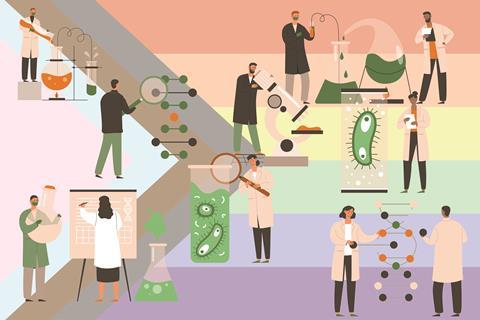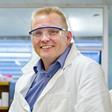Why RSC president Tom Welton doesn’t want to make the change alone

When I arrived at the University of Sussex in 1982, the university offered me a safe place to be myself in a homophobic world where other gay people I knew were being sidelined, taken off projects and losing their jobs.
In my little bubble of academic chemistry I have always found being an out, gay man unproblematic. People are, quite rightly, more interested in my reactions and materials than my sexuality. But having known people who’ve faced hostility and violence because they are gay, I’m pleased I got to spend that time in a more tolerant environment. Not thankful, because that’s how it should be, but pleased.
We are all role models, whether we like it or not, and regardless of our sexual orientation
I know, however, my own experiences are not what many other LGBT+ people experience, even today in way more tolerant times, which is why inclusion and diversity in science is so important to me. Now I am fortunate enough to be serving as RSC president, I want to make a big difference in diversity, but it’s not something that I want to do on my own: I want you to join me too.
Using our reach
Everyone can play a part in making our society more diverse and a more inclusive place to be. It’s easy to think you are powerless because, for instance, you are not a senior manager in your organisation, but every single one of us has a ‘reach’. As president, my reach is long (and I intend on using it) but even if your own reach only extends across the bench or within your classroom, you can still use that to make a difference and make your own workplace more inclusive.
At this point you might be thinking: ‘Am I bovvered?’ Your chemistry is going to work just as well whether you are gay, straight, bisexual, trans or any other orientation. Well, we do it because it lets people know in environments other than academia that it’s OK to be out. We are all role models, whether we like it or not, and regardless of our sexual orientation.
Adding a human element will help some people connect with the topic being taught
This last point is particularly relevant to teachers, who are perhaps some of the most important role models for young people that we have. Nobody should think that being LGBT+ is a barrier to being a scientist (or anything else, for that matter) and that’s a crucial message teachers can help deliver. Ask yourself: am I displaying the messages that I want to give? Am I being supportive and positive to developing teenagers’ needs? Am I making people think, ‘Yes, LGBT+ people can be scientists too’? That might sound obvious to you and I, but let’s not forget how impressionable our young people can be.
And what can this magazine do? It can help teachers to do this by highlighting the work of LGBT+ scientists. I don’t expect every school teacher to google every scientist to find out their sexual orientation, nor do I expect this to be the main focus of a lesson, but I think Education in Chemistry can help highlight LGBT+ scientists working in different areas, especially as new topics (such as mine) hit the curriculum.
In the classroom
Students benefit from linking a topic they are learning about to a personal story, and this may be the ideal opportunity to mention a person’s sexuality. It’s not a distraction from the learning; it’s an addition. Adding a human element will help some people connect with the topic being taught who wouldn’t otherwise connect with it.
This shouldn’t feel forced. Remember we’ve come a long way from the days of section 28, when it would have been illegal to tell pupils that my marriage to my husband was as valid as any heterosexual marriage. Now I’d bet every pupil in a classroom knows someone who’s LGBT+. It’s not just accepted, it’s celebrated.
Changing attitudes towards LGBT+ people across the world won’t happen overnight. I can’t pull a lever and cause a huge revolution tomorrow. The change we want to see – which is already well underway – will be the result of millions of personal choices, actions and role models. People of every sexuality will slowly find more strength and comfort in seeing more open and out LGBT+ people around them, so they too can have that openness.
In the end, I sincerely hope, everyone will see how boring LGBT+ people can be! You don’t have to go back very far to find a time when we were considered quite exotic, but now with civil partnerships and same-sex marriage, our heterosexual neighbours realise that our lives are actually just the same as theirs. And that is a great place to be.











No comments yet